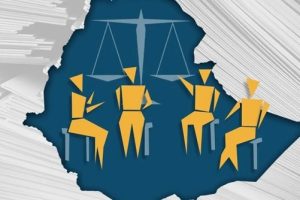
History cannot ignore Ethiopia’s contributions to Africans’ freedoms. The victory of Adwa, under leadership of Menelik II, has been known as a victorious symbol of African peoples that because Ethiopia’s wining spirit had propelled them for further inspiration to fight against colonial powers.
Following most of African peoples’ independence, Emperor Haile Selasie I had played significant role to organize the independent African countries. The majesty’s effort gave rise to bring independent African leaders to the same position, and eventually together founded OAU. Ethiopia, when under Emperor Haile Selasie I, and President Mengistu, had supported the prominent freedom fighters led by Mandela of South Africa, and Mugabe of Zimbabwe respectively.
Regarding peace, Ethiopia has been continuing to involve in peace keeping process, since the Ethiopian military mission to Korea, up to recently to the land of Somalia. Additionally, in the last quarter of the nineteenth century, under the kingship of Yohanis IV, the Ethiopian troops led by Ras Alula, fought for the sake of Egypt, against the Mehadists rebellion, and even if the war costs lives, helped the Egyptian war captives, nearest 500 soldiers, to evacuate from Mehadists’ control.
Contextually, as history witnessed, Ethiopia is not aggressor rather seems to be known as a country which stands for others’ freedoms. However, Ethiopia has politically strong foreign relation strategy, especially for its national security and economic integrity towards neighboring countries in comparison to others distant states.
Here, my piece aims to briefly discuss about the existing internal political environment that challenges the Ethiopia’s reform which is going on under the new reformist leadership. And it also suggests ideas that contribute to a better understanding of solving problems threatening the political system.
For Ethiopians, the Horn politics and the Nile waters are national obsession. There are presently two odds: the Nile waters hydro-political issues and the FDRE Constitutional Deadlock, with accompanying the COVID-19 pandemic.
Concerning FDRE Constitution, following the fall of Derg regime, the rebel groups have controlled the state power under TPLF rule, in 1991. These armed groups, including, few civilian individuals had together formed interim government assembly comprised of 86 seats, led by President Meles Zenawi, who later became prime minister of FDRE.
After four years of transitional government, the Federal Democratic Republic of Ethiopia, the new constitution has come into effect as of the 21st day of August, 1995. The FDRE constitution has been criticized that, as a factor that Ethiopians are politically being polarized themselves in effect. This polarization in turn makes political parties and their leaders to see each other as enmities. Such devilish practice has been experienced for the last three decades now.
Presently, the political contest between TPLF, as opposition party in the federal level, and the reformist ruling party, often played out on the floor of the House of Peoples Representatives, is increasingly to be found in the coming (the sixth round) national election. Unfortunately, constitutional deadlock is becoming as a source of disputes between political groups.
In fact, one of the main features of modern constitutional democratic states is the recognition of human rights and the establishment of an independent constitutional adjudicator empowered to resolve constitutional disputes. The FDRE Constitution provides that ‘’all constitutional disputes’’ shall be decided by the House of Federation which has 135 members.
Undoubtedly, since the Ethiopian federal structure is drawn along ethnic lines, the Constitution underlines the emphasis on and priority to ethnic groups. Surprisingly, the FDRE Constitution is probably the only constitution that begins with ‘we the nation, nationalities, and peoples of Ethiopia’, instead of saying ‘we the people of Ethiopia’. From this observation, one can understand that the preamble of the constitution makes clear that the social-contract is only amongst ethnic groups. As a result, the House of Federation, can become a better guardian of the rights and interests of minorities.
Despite, the system of Ethiopia’s constitutional review represents an institutional design deficit. The constitutional crisis which arises as a result of postponing the coming election is undoubtedly, constitutionally to be solved.
In contrast, while individual political leaders, who are aspiring state power, are in poor terms with government act, the number of victims of Covid-19 is increasingly seen and it is also spreading among the people.
Of course, the presence of Covid-19 pandemic has forced Ethiopians to postpone the coming election, because, to get time to beat Coronavirus first. This is the reality on the ground, that’s why people preferred staying in life than to elect their representatives.
Obviously, in Ethiopia, things have also indicated that citizens are politically and socially facing challenges in their way of life. It is clear that such irregularities are expected on the way of reform. But, if political leaders cannot afford, the ability to treat internal political problems within the legal frame of constitutionality, would have led ‘political stress’, and which others coin the phrase as ‘political blindness’ to describe the particular existing political culture which has grown out of political environment with long ageing undemocratic and dictatorial rule. However, the Ethiopian Government has now engaged to solve the problem through constitutional inquiry other than any unconstitutional scenarios.
In the history of the Horn, given the extremely difficult context, Ethiopia can proudly point to some progress in regional cooperation and collaboration, sharing its experiences in managing diversity and state formation of engagement with outside cultures and influences.
Regional integration in the Horn is particularly challenging due to the web of long-run, conflicts, rivalries, alliances and anti-alliances that shape relationships among countries. At the same time, within-country politics are also subject to widely varying political settlements and capacities to govern.
The part of Africa that is of some significant geo-strategic importance for external is the Horn of Africa. This was due to its proximity to the commercial sea routes of the Red Sea and the Gulf of Aden and to the Middle East. Horn countries individually remained weak both politically and economically to defend themselves and protect their interests. This made them vulnerable to easy external intervention. Thus, it seems that interventionists understood that they could easily intervene in the Horn.
The Horn of Africa is perceived as a dangerous theatre of conflict, because of the growing regionalization of the conflict, is becoming a great concern. Africa has witnessed the Al-Shabaab ‘blow-back’ on Kenya, Uganda and Djibouti, in addition to this, the deployment of Djibouti, Ethiopia, Kenya and Uganda has turned Somalia into a turf battle for regional geo-strategic interests.
Studies on the field disclosed that during the past ten years (2004-2014), the AU has increasingly been responding to the peace and security challenges (PSC) facing the continent as crisis situations from all regions of Africa attracts involvement of the African Union. In these studies, East Africa is the region that dominated the agenda of the PSC, accounting for just about 50 per cent of its agenda (or 208 sessions). This largely corresponds to the level of peace and security challenges that the region has experienced. The report also added that, this high level of engagement in East Africa has been due in particular to the various conflicts in Sudan and Somalia. The study also indicates numerous, if not overwhelming, challenges. The changing nature of the conflict is a major challenge which has been at the level of the pace with which Al-Shabaab is morphing both ideologically and operationally.
The peace and security of the region, for Ethiopia, is a great national concern. The reason behind is, that can be classified in to two; first, Ethiopia has geopolitical proximity to the countries of the Horn, and the peoples of the Horn countries have also common identities and cultures with the peoples who live on their respective periphery regions of Ethiopia, vulnerable to any foreign threat. Second, except Egypt, East African region comprises all the Nile Basin riparian countries, and the existing politically volatile situation in the region is perceived as a place where that ‘having an open flame on explosive area is not assurance for peace’. So the potential for conflict seems to be inevitable.
Regards to Nile waters politics, the discussion between Ethiopia, Egypt and Sudan, is going on. However, unprecedented intervention of IMF and US – treasury and their position that have shown to support Egypt doesn’t help the riparian participants to become in possible solution.
Notably, for Ethiopians, the Nile water issue and the Horn stability are National obsession. Egypt, wrongly perceived that, as if Ethiopia cannot afford to build any Dam, because of financial constraint, even at the beginning of the construction of GERD, it also beliefs that the Ethiopian government couldn’t able to finish the work. As time goes, the construction of the Dam is closer to be completed; this has propelled Egypt to further anxiety to act against the right of Ethiopia.
Of course, Ethiopia keeps its promises that struggling for the use of water among the riparian countries is to share in equitable manner. On the other side, Egypt is, regardless of CFA agreement, struggling for its hegemonic rule over the Nile water. The dynamics of the hydro-political relations has realized that back to the colonial and post-colonial agreements over Nile issue is chimerical.
Here, history cannot deny that Ethiopia is probably a country which had, let alone the colonial agreements, resisted and defended the aggression of colonial powers. For example, in post Adwa victory, while emperor Minilk II was seriously in seek, three colonial powers had signed ‘the Treaty’ in ambition to decide a future of the country, after the emperor. This event shows that, how external powers are seeking even now, to intervene in other countries, at the expense of any incident that may happen. However, the emperor had proven to the colonial powers that Ethiopia couldn’t allow any intervention comes from outside, by arranging the first cabinet which comprised of 12 ministers, in the history of Ethiopia, and then the intention of the treaty was failed to its ambition for power succession.
From the above point of discussions, the Ethiopian reformist leaders are presently awaiting mainly two odds.
These are the Constitutional deadlock which arises because of postponing the coming election, and the foreign threats.
The Ethiopian government responses to the crisis represent an evolving and increasingly prominent role of its public legitimacy, and especially to pay attention on the promotion of regional security in the Horn of Africa, in particular to watch the web alignments between the gulf states and countries of the Horn. At the same time, the hydro-political stance implies that Ethiopia will need to continue to forge diplomatic amity with international actors in addressing these complex long ageing issues on Nile waters, to reverse Egypt’s appeal to the UN Security Council.
Finally, the author would like to stress that Politicians and individual activists are responsible to avoid any alarmism that threatening Ethiopia’s national security, and also advise political leaders to set their mind for a balanced, thoughtful consideration of the risks to potential latent conflicts.
The Ethiopian Herald May 15/2020
BY TIGESTU AWELU HASSEN


